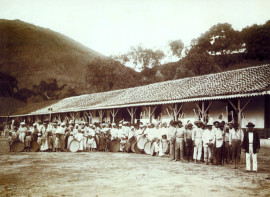
Using an ideal setting from a major food safety crisis, we estimate a full demand model for the unsafe product and its substitutes and recover consumers’ preference parameters. Counterfactual exercises quantify the relevance of different mechanisms –changes in safety perceptions, idiosyncratic tastes, nutritional characteristics, and prices–driving consumers’ response. We find that consumers’ reaction is limited…
- Fecha(s): 21/03/2019
- Lugar: Seminario del departamento de Economía aplicada. Retransmitido en directo.
- Ponente: David Jiménez (U. Alicante)

Abstract: Nudges, which are interventions that do not restrict choice, have become widespread in policy applications. I develop a general and tractable framework to analyze the welfare implications of nudges. In this framework, individuals suffer from internalities (their utility when choosing is different from their welfare-determining utility) and choice and welfare depend on the environment,…
- Fecha(s): 14/03/2019
- Lugar: Seminario del Departamento de Economía Aplicada. Retransmitido en directo.
- Ponente: Daniel Gallardo-Albarrán (University of Groningen)

Abstract Few topics in economic history have received more attention than the profound transformations undergone by Great Britain during the 18th and 19th century. Even though the positive outcomes of this process for human living standards nowadays are not disputed, the same does not apply to the century spanning from 1750 to 1850 in Great…
- Fecha(s): 07/03/2019
- Lugar: Seminario del Departamento de Economía Aplicada. Retransmitido en directo.
- Ponente: Luiz Fernando Saraiva y Rita Almico (Universidade Federal Fluminense/Brasil)

Abstract La investigación busca interpretar el proceso de crecimiento de la economía brasileña de la mitad del siglo XIX y principios del siglo XX reconociendo la importancia fundamental que el trabajo esclavo y los seres humanos esclavizados tuvieron en ese proceso. Utilizando datos estadísticos y demográficos, intentamos demostrar la estrecha y difícil relación entre esclavitud…
- Fecha(s): 28/02/2019
- Lugar: Sala de Seminarios del CIO (Edificio Torretamarit).Universidad Miguel Hernández (Campus de Elche). Se grabará.
- Ponente: Juan de Dios Moreno Ternero (Universidad Pablo de Olavide de Sevilla)

Abstract: We consider the problem of sharing the revenues from broadcasting sport league events, introduced by Bergantiños and Moreno-Ternero (2019). We characterize a family of rules compromising between two focal and somewhat polar rules: the equal-split rule and concede-and-divide. The characterization only makes use of three basic axioms: equal treatment of equals, additivity and maximum…
- Fecha(s): 28/02/2019
- Lugar: Seminario del Departamento de Economía Aplicada. Retransmitido en directo.
- Ponente: Manuel Pérez García (Shanghai Jiao Tong University)

Abstract Global History, as a theoretical framework, has been in constant evolution during the last few years. Nevertheless, as the discipline reaches its maturity, the need to push the boundaries of the field becomes clearer; global historians need to avoid the stagnation of the debate by implementing research agendas that incorporate archival sources coming from…
- Fecha(s): 07/02/2019
- Lugar: Seminario del Departamento de Métodos Cuantitativos para la Economía y Empresa, UMU. Retransmisión en directo.
- Ponente: Luis Aguiar. European Commission – Joint Research Center

Abstract: Digitization has vastly increased the amount of new music produced and, because of streaming, has raised the number of songs available directly to consumers. While enhanced availability has levelled the playing field between already-prominent and new artists, creators may now be highly dependent on platform decisions about which songs and artist to promote. With…

Abstract: Empirical observation shows that policies are usually gradually introduced in a society. This paper presents a model of repeated elections that captures this phenomenon, and that allows countries to differ in their institutional flexibility, thus in the speed of implementation of new policies. We show that with gradual implementation of policies there is an…
- Fecha(s): 17/01/2019
- Lugar: Salón de Actos (Facultad de Económicas ) Universidad Nacional de Educación a Distancia UNED
- Ponente: Carlos Vidal Meliá (Universidad de Valencia)

Para poder seguir el seminario, usad el siguiente link (no hace falta autentificación) https://canal.uned.es/live/event/5c35a9fdb1111fd1708b4567 Habrá una grabación para que puedan efectuar la tarea aquellos que no se puedan conectar.
- Fecha(s): 01/02/2019
- Lugar: Seminario de Fundamentos del Análisis Económico Martínez Gallur
- Ponente: Luís Corchón

Abstract: In this paper we investigate the use of consumer surplus in monopoly when the consumption of the outside good cannot be smaller than a certain number and when the weights given in the social welfare function to consumers and the firm are different. We assume quasi-linear utility and constant returns to scale. We find…











